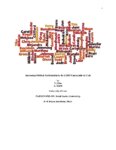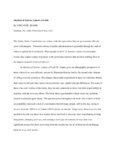|
|
Creator | Title | Description | Subject | Date |
| 1 |
 |
Hall, Thad | Are Americans confident their ballots are counted? | Expanding the large literature which investigates the characteristics of citizen and voter trust in government we analyze the heretofore neglected topic of voter trust in the electoral process. In this paper, we present results from three national surveys in which we asked voters the confidence they... | Election reform; Public management; Principal-Agent Theory | 2006-07-20 |
| 2 |
 |
Hall, Thad | Controlling democracy: the principal-agent problems in election administration | Election reform has become a major issue since the 2000 election, but little consideration has been given to the issues associated with managing them. In this article, we use principal agent theory to examine the problems associated with Election Day polling place voting. We note that Election Day v... | Election reform; Public management; Principal-Agent Theory | 2006-07-20 |
| 3 |
 |
Svedin, Lina | Crisis management in Russia: overcoming institutional rigidity and resource constraints | The editors would like to express their gratitude to a number of persons and institutions for making this book on Russian crisis management possible. We are grateful for the generous financial support from the Swedish Agency for Civil Emergency Planning (?CB) which has made the CM Europe program (of... | | 2002 |
| 4 |
 |
Holzner, Claudio A.; Jameson, Kenneth P.; Maloney, Thomas N.; Abebe, Berhanie; Lund, Matthew; Schaub, Kristen | Economic impact of the Mexico-Utah relationship | This study began during the Summer of 2005 and set out to examine the complexity of the globalized relation between Utah and Mexico, concentrating on broadly defined "economic linkages." It was designed to build upon earlier similar studies done in Arizona and in Texas on those states' relations wit... | Economics, Utah; Migration; Immigration; Mexico; Undocumented immigrants | 2006-03-10 |
| 5 |
 |
Francis, Leslie | Eminent domain compensation in the Western states: a critique of the fair market value model | Both the United States Constitution and the constitutions of the states of the intermountain west and the Pacific Coast prohibit the state from taking property without paying just compensation. Thus, there are two basic issues in any eminent domain case. First, has governmental interference with pro... | Eminent domain; Compensation; Governmental interference; Fair Market Value | 2006-06-16 |
| 6 |
 |
Francis, John G. | Evolving regulatory structure of European church-state relationships | In Western Europe, many contemporary churches have achieved remarkable levels of administrative autonomy and tangible resource support. Yet paradoxically, public participation in the traditional churches appears marginal. In Eastern Europe under Communism, churches experienced varying levels of hos... | Regimes; Environment; Regulation | 1992 |
| 7 |
 |
Kukathas, Chandran | Explaining moral variety | Reflection on the variety of forms of social life has long been a source of moral skepticism. The thought that there are many radically different social systems, each of which colors the way its members think about moral and political questions, has been thought by many moral philosophers to underm... | Standards; Cultural; Criticism | 1994 |
| 8 |
 |
Kukathas, Chandran | History of political theory and other essays (Book Review) | Reviews the book `The History of Political Theory and Other Essays,' by John Dunn. | Books; Political Theory | 2001-09-17 |
| 9 |
 |
Francis, John G. | HIV treatment as prevention: Not an argument for continuing criminalisation of HIV transmission | HIV prevention and treatment are undergoing impressive technological and practice changes. In-home rapid testing, prophylaxis before risky sex, and treatment as prevention give cause for remarkable optimism and suggest the possibility of an AIDS-free generation. These changes in HIV prevention and t... | | 2013-01-01 |
| 10 |
 |
Hall, Thad | How hard can it be: do citizens think it is difficult to register to vote? | Political equality is seen as an intrinsic normative principle for the adequate functioning of a democratic republic. However, it is well documented that in the United States there are many qualified citizens who do not vote, many who do not participate in the political process due to procedural ... | Voting, United States; Voters; Non-voters | 2006-08-31 |
| 11 |
 |
Hall, Thad | Human dimension of elections: how poll workers shape public confidence in elections | The role of voting technologies has received considerable attention since the 2000 election. However, the voter experience at the polling place and especially the voter-poll worker interaction is also of critical importance. Rarely are poll workers considered an arm of the government, even though th... | Poll workers; Voter confidence; Election outcomes; Voter perceptions | 2006-07-20 |
| 12 |
 |
Cline, Nicole L.; Martz, Amy Louise | Increasing political participation in the LGBT community in Utah | Discriminatory practices and hate crimes against members of the Lesbian, Gay, Bi-sexual and Transgendered (LGBT) community runs as deep as societies themselves. Throughout history the social roles that various segments of the LGBT community have been both highly regarded as well as despised in human... | LGBT; Politics; Voting; Elections | 2013 |
| 13 |
 |
Hall, Thad | Internet voting in comparative perspective: the case of Estonia | ABSTRACT Several countries have conducted Internet voting trials in binding public elections over the past decade, including Switzerland, the United Kingdom, and the United States. However, Estonia-a former Soviet republic and now a full member of the European Union-has advanced the farthest in dep... | | 2009-07 |
| 14 |
 |
Francis, John G.; Benedict, Robert Cone | Issue group activists at the conventions | The rise of the new single issue groups has presented the Republican and Democratic parties with a novel challenge to their historic roles as broad-based coalition parties. Both parties now confront groups within their ranks that demand of party nominees a strict commitment to the position held by t... | Single issue groups | 1986 |
| 15 |
 |
Francis, Leslie | Justice through trust: disability and the Outlier problem in Social Contract Theory | The article focuses on the flaws of the social contract theory. It explores how hostile the social contract as a bargaining process has been thought to distance disabled people from contract-based justice. It analyzes the argument that the history of social contract theory exclude the people with di... | Consensus, social sciences; Discrimination; Social contract; Social ethics; Sociology of disability | 2005-10 |
| 16 |
 |
Kukathas, Chandran | Looking backward: a critical appraisal of communitarian thought (Book Review) | Reviews the book `Looking Backward: A Critical Appraisal of Communitarian Thought,' by Derek L. Phillips. | Books; Communitarianism; Philosophy | 2001-09-17 |
| 17 |
 |
Cline, Nicole L. | Markets of sorrow, labors of faith | The United States Constitution was written with the expectation that our government officials serve with integrity. Normative theory of public administration is grounded through the oath of office to uphold the Constitution. When people in the U. S. become victims of catastrophic events, they expect... | | 2013-01-01 |
| 18 |
 |
Hall, Thad; Roberts, Brian F. | Military voting and the law: procedural and technological solutions to the ballot transit problem | During the 2000 presidential election controversy in Florida, the ballots submitted by individuals living overseas-especially military voters-were seen as crucial to the election outcome as the margin of potential victory was so small that these ballots could turn the election from one candidate ... | Military, Voting; United States, elections; Absentee Ballot | 2007-01-12 |
| 19 |
 |
Kukathas, Chandran | Multiculturalism of Fear (Book Review) | Reviews the book "The Multiculturalism of Fear," by Jacob Levy. | Books; Multiculturalism; Fear | 2003-10-16 |
| 20 |
 |
Francis, Leslie | Penn Central Transportation Company v. New York City: easy taking-clause cases make uncertain Law. | In Penn Central Transportation Company v. New York City, the Supreme Court held that New York City's Landmarks Preservation Law as applied to Grand Central Terminal was not a "taking" of property for which compensation is constitutionally required. The decision has been hailed as a major victory for... | Law; Compensation; Property Rights; Landmarks Preservation Law; Supreme Court Rulings | 2006-06-16 |
| 21 |
 |
Francis, Leslie | Permissiveness and control (Book Review) | A review of the book "Permissiveness and Control". | Books; Philosophy | 1981-10 |
| 22 |
 |
Hall, Thad | Poll workers and the vitality of democracy: an early assessment | The aftermath of the 2000 election has been a time of constant learning in regards to election administration in the United States. Both scholars and policy makers initially focused primarily on voting technology and on which voting technologies were best at capturing votes. In early 2001, the Calte... | | 2007-10 |
| 23 |
 |
Francis, John G.; Lubomudrov, Slava | Precinct straddling of city boundaries | Suppose a situation in which citizens of a particular city vote in county, state and national elections, but in which their combined vote for each candidate is not clearly separable from the votes of residents of adjacent areas outside of the city. It can be argued that the inability to identify th... | Residents; Voting; Elections | 1978 |
| 24 |
 |
Francis, John G. | Public lands institutions and their discontents | The history of the federal lands has been marked by recurring debates over the nature of the land tenure system in the West. The fundamental and enduring nature of these debates has been quite apparent recently, for serious attention has been paid to the following specific proposals. Should the owne... | Federal lands; United States | 1986 |
| 25 |
 |
Francis, John G.; Francis, Leslie P. | Rationing of health care in Britain: an ethical critique of public policy-making | IN BRITAIN, as in the United States, rationing of health care is a fact of life and death. Some rationing is overt, such as the Stanford heart transplant program's decision not to accept very young or older patients.1 Some is disguised, such as day-to-day decisions in hospitals about "do not resusci... | Rationing; National Health Service | 1986 |

























